‘Our brother shot our father dead. It was a heroic act’
Sitting in his prison cell, Glenn Stratton didn’t know whether the world, or even his own family, would call him a murderer for the extraordinary mercy killing he’d just committed.
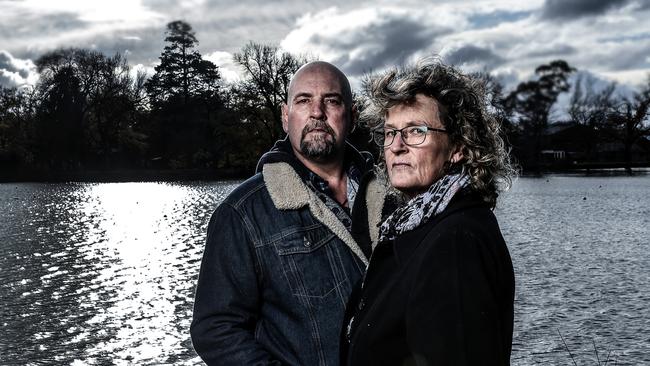
Sitting alone in his prison cell, Glenn Stratton did not know whether the world, or even his own family, would call him a murderer. Yet that was the crime he had been charged with. He had shot his own father, Colin, in the head. He had admitted it. “A Castlemaine man accused of murdering an elderly man in his own home will remain behind bars,” the local paper would say the next day. But criminal law wasn’t written for a case like his.
Before Stratton could explain his actions to anyone else, the 53-year-old carpenter and father of five had to reconcile it with himself. Inside his Melbourne jail cell he picked up a pen and, in neatly looped letters, he wrote poems about the darkness that was enveloping him.
Deep in my heart where my family reside
Lies also a place where I know I can’t hide
For what’s in my mind just won’t go away
And will always be with me at the start of each day
But life must go on for my children will need
A dad who will be there once he is freed…
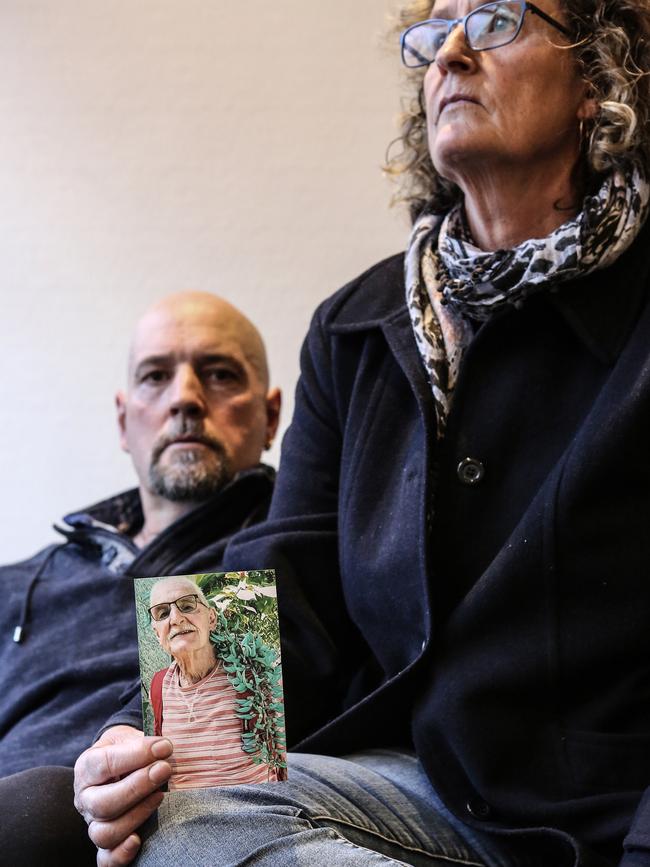
A year on, Glenn’s sister Donna stares at the poems her brother wrote in jail and shakes her head. “He will never be the same, we’re lucky he is still here,” she says of Glenn. “He is the victim in all this.” Her brother Searle nods. “The system let all of us down,” he says. “Glenn is my hero. We never want any other family to go through a day like that.”
That day, May 24 last year, has been replayed on a hellish loop in the minds of the three close-knit Stratton children. It saw their beloved father killed, it up-ended their lives, especially Glenn’s, it confounded the justice system and it raised serious questions about whether Australia has struck the right balance in its new state-based voluntary assisted dying laws.
Colin Stratton woke up at his home in Castlemaine, northwest of Melbourne and, without warning his family, decided that this would be the last day of his 80 years of life. “I was surprised but I shouldn’t have been,” says Donna of her father’s decision that day. “He was losing all those things that gave meaning to his life.”
She says Colin had lived a happy life but even before he was diagnosed with terminal cancer he had given careful thought to the manner of his death. “He always said that if he got really sick he wanted to choose his time to die. We would have family meetings where we would talk about it. Both my parents joined the Dying with Dignity group.”
Ask Donna and Searle about their dad and they prefer to talk first about his large life rather than his death. They paint a compelling portrait of a man of many passions. He loved his lifelong job as a linesman with the State Electricity Commission; he adored Suzanne, the love of his life and his wife of 53 years. He loved cooking, wine, woodwork, gardening and collecting rare rocks and minerals. “Most of all he loved his family,” says Donna. “It was all about family.”
“Pa was my superman and biggest hero,” Colin’s grandson Daniel wrote after his death. “Pa was the one who showed my twin brother Cameron and I how to use the toilet standing up and how to shave long before we would have had facial hair. He was cheeky and funny… he was a father and grandfather all rolled into one.” In his handwritten victim impact statement after Colin’s death, his son Searle wrote: “My father was the benchmark for which I judged all men, he was everything I envisioned a real man to be. The greatest man I’ve ever known has been taken away from me.”
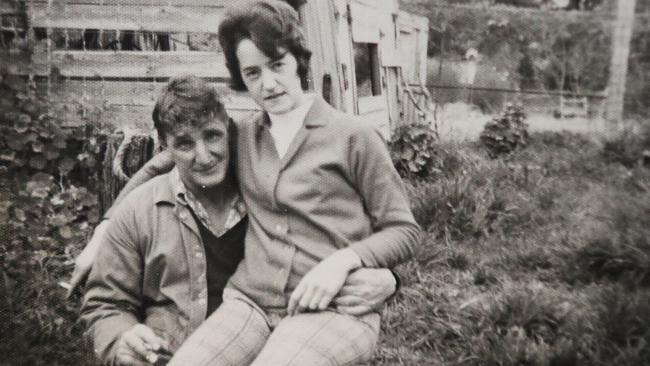
Glenn, Searle and Donna recall a rough-and-tumble but loving childhood; how their parents would “go bush” with them on school holiday camping adventures across Victoria. They say Colin only began to think about euthanasia in 2007 when Suzanne suffered her first stroke, which left her with mobility issues. When she died in 2015 of a brain haemorrhage, Colin was so grief-stricken that Glenn returned from living in Queensland to look after him. Glenn, who was divorced, was a happy-go-lucky but quietly spoken carpenter. He had lived for more than a decade in the Torres Strait Islands where he married, ran his own business and raised five children.
Glenn was living with his dad in 2018 when Colin was diagnosed with an aggressive form of bowel cancer and was given only a 50 per cent chance of surviving surgery due to serious pre-existing heart problems. He survived the surgery but in September 2019 he learnt that the cancer had spread throughout his body and he was given a terminal diagnosis. Colin told his children that he wanted to die at the time and manner of his choosing and that month he signed an Advance Care Directive. In it he wrote in scrawled handwriting: “If I suffer from any serious medical event, let me die… I want the pill so that I can choose when.” He added: “No palliative care.”
And yet Colin continued to fight the disease, switching to a new immunotherapy treatment and spending $70,000 to fund it. According to his doctor, the treatment produced positive results and temporarily stabilised his cancer. This meant that his death was not considered “imminent”, which under Victoria’s Voluntary Assisted Dying Law passed in 2017 means within six months. In other words, Colin did not qualify for the so-called “suicide pill”, which requires someone to have less than six months to live. But Colin was determined to choose his own timing and he asked his kids to try to source the fatal medication. “We tried to buy it online but we got scammed,” says Searle. “Dad lost $4000, I lost $2500.”
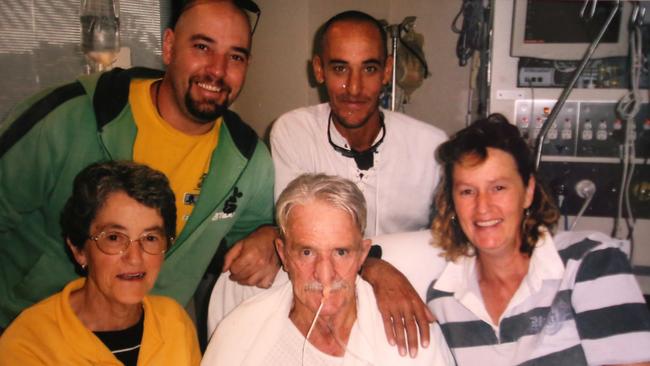
By early last year, Colin’s cancer remained stable but his quality of life was slipping as his health began to fail in other areas. He suffered from osteoarthritis and Meniere’s disease, which affects balance and hearing, among many other conditions. A few months before his death he spent 10 days in hospital because of excess fluid in his legs caused by creeping heart failure. “Because of all of his treatments he lost his taste and he loved his cooking and his wine,” says Donna. “Because of his bad knees he couldn’t garden anymore, which he also loved. He also had to stop woodwork. He couldn’t feel his fingers or his feet and he was about to lose his driver’s licence because of it. Basically, he was in constant pain and he could not do all those things that gave enjoyment to his life.”
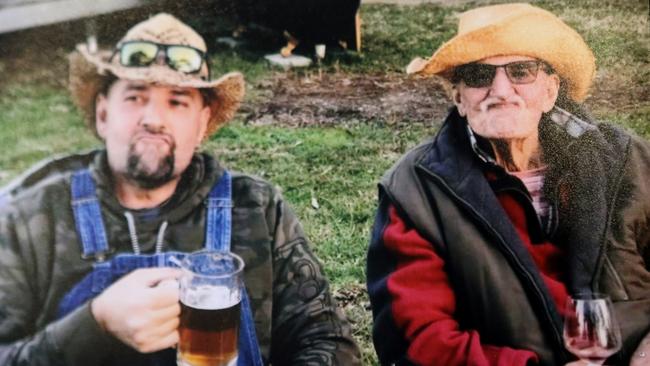
On May 18, 2021, a week before his death, Colin added a page to his Advanced Care Directive. Searle and Donna, sitting in their lawyer’s office in Bendigo, can still recall the words their father wrote. “I do not do this because I am depressive or anything but because I feel now is the right time,” Searle recites from memory. Donna says her dad showed it to her and asked her to photograph it so the family were all “on board” with his decision. But Colin did not tell his family what he was going to do next. He had circled 10.30am on May 24 on his calendar. “I saw it a few days earlier and I asked what that appointment was for and he said, ‘I can’t remember.’ But I now think he knew that’s when he was going to end his life.”
On that day, Colin drove himself to his local doctor at 8.50am. He didn’t have an appointment and he insisted on seeing someone immediately. He told the doctor he was in constant pain and that his “body has given up”. He asked her for the “suicide pill” and said that if she wouldn’t help him get it that day he would go home and shoot himself in the head. The doctor told him that the paperwork could begin immediately to apply for the voluntary assisted dying process (VAD) but even if he qualified, the process would take up to two weeks to be approved.
The doctor rang Glenn, who arrived with Donna at the clinic to find their father in a highly agitated state. “He was sitting there saying to us he wanted the pill to end his life and that now was the time,” recalls Donna. “The doctor said, ‘Come on Colin, let’s sit down and talk about this’ but Dad said, ‘That’s it, I’m done talking about this. I’m going home to shoot myself’.”
Colin asked Donna to come back home with him and help him load the gun but she refused. He then asked Glenn, who urged him not to kill himself but at the same time said he would help him to do what he wanted. Donna starts to sob as she recounts what happened next: “I asked Glenn to go home with him and I feel that by doing that I threw Glenn under the bus. I never realised Glenn would have to do it himself.”
Donna stayed at the doctor’s clinic while Glenn drove Colin home. When they arrived, Colin instructed his son to fetch the gun and a bullet from the shed. Colin sat down in his favourite chair on the back veranda and when Glenn returned with the gun, which his father had given him for his 14th birthday, he made one last plea for his dad to change his mind. “I’m doing this today, with or without your help,” Colin replied.
He turned the rifle on himself but couldn’t reach the trigger. So he put the butt of the rifle into Glenn’s hands and said, “I’ll count down.” Once, twice he got to zero but Glenn couldn’t do it. On the third time his father yelled, “Don’t make me make a bloody mess of it, I can’t do this by myself.” As Colin counted down for the third time, Glenn said to his dad, “I love you”. “Likewise,” said Colin. Glenn pulled the trigger, firing a single shot into his father’s forehead.
Shortly after, Donna arrived at Colin’s home, not knowing what she would find. “I walked in and I found Glenn sitting on a milk crate with his head in his hands,” she says. “He’s over there, he’s already done it,” Glenn told her.
“Dad was sitting in his favourite chair with his fluoro orange beanie on and he looked at peace,” she recalls. “His head was just leaning forward, he looked so calm. I just hugged him and he was still warm and he still smelt like Dad. I then hugged Glenn and the police came.”
Glenn admitted to police that he had helped his father pull the trigger. He explained why, but the cold fact was that he had just shot another person dead. He was arrested and taken to Castlemaine Police Station and charged with murder. Donna only learnt later, after Glenn had been arrested, that her brother had fired the gun. But she couldn’t believe he had been charged with murder and jailed as a result. “We wanted to grieve as a family but instead we were turning up to court to support Glenn,” she says. “He was the victim in our eyes.”
Searle says it took more than a week before he was allowed to talk with Glenn in prison and that during that time Glenn did not know if his siblings would back him or ostracise him for shooting their dad. “When I finally spoke with him I told him that the whole family was behind him. He didn’t know whether we were supporting him or whether we hated him. I only had three minutes to speak so I told him we loved him, the whole family was behind him and that we were not going to stop until we got him out. He was overwhelmed.”
The family went to a local law firm in Bendigo, Lakey Legal, and met with a solicitor, John Fuller. A former policeman, Fuller quickly saw that this was a mercy killing rather than a murder but he warned Donna and Searle that Glenn might still face an extended period behind bars. “Glenn in my mind acted in a selfless, courageous and compassionate way to assist his father,” says Fuller. “He consciously put his father’s wishes and needs before his own, knowing the consequences of his actions would likely lead to a significant term of imprisonment. But we were always fearful that Glenn would serve a term of imprisonment as a way of the justice system showing that while it was sympathetic to Glenn’s plight, it was still necessary to send a message to the community that the actions of Glenn, while well-intentioned, could not be condoned.”
The wheels of justice turned slowly as all parties examined Glenn’s unusual case and eventually concluded his actions fell short of murder. He spent 46 days in jail before being released on bail on July 8. Two months later, the Office of Public Prosecutions agreed to downgrade the charge from murder to aiding and abetting a suicide, which carried a sentence of up to five years’ jail.
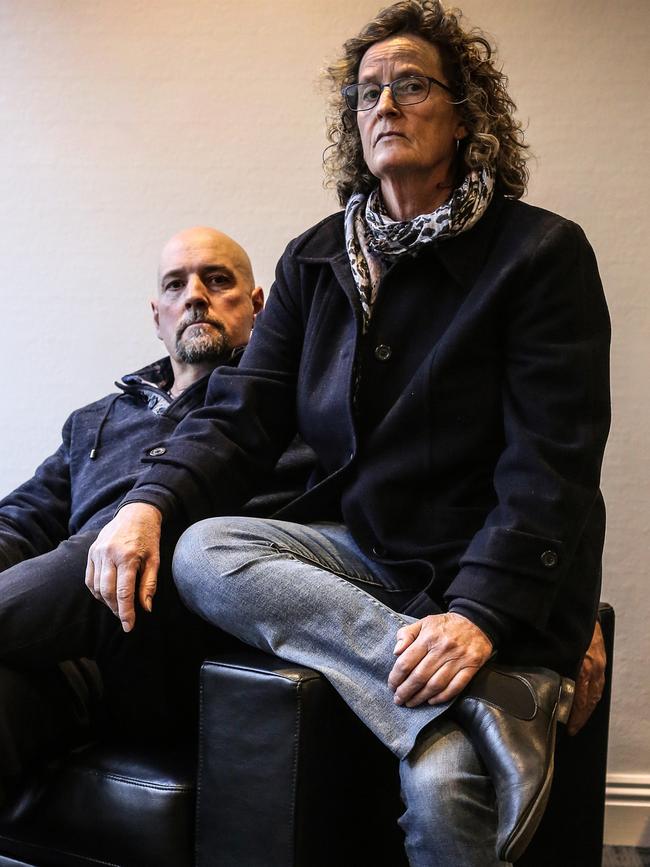
Donna and Searle say that when Glenn was released from jail, they could no longer recognise their brother. “He was broken and traumatised,” says Donna. Searle says Glenn told him he doesn’t regret ending his father’s suffering but that Glenn believes “the system” failed his father and that he should never have had to die like that. They say Glenn now suffers from severe PTSD and was not well enough to be interviewed for this story.
In their victim impact statements, both Donna and Searle gave heartfelt tributes to their brother. “Glenn is struggling with his decision to help Dad, but I know how demanding Dad would have been,” Donna writes. “Glenn is often withdrawn and struggles mentally every day. He struggles to keep what happened out of his mind and this will torment him for the rest of his life. [But] I am so proud of Glenn, the courage he displayed in helping Dad with his last wish. Whilst legally wrong, it is the most selfless act that anyone could have done, and this has changed him forever.”
In Searle’s handwritten victim impact statement, he writes: “The few things that console me, that ease the pain inside, is knowing my father is no longer in pain… my new hero is now my brother, for sacrificing his own freedom in the greatest act of love one can commit!!!”
Glenn pleaded guilty, and by the time the Supreme Court in Bendigo heard the matter on December 3, 2021, both the prosecution and defence were almost united, with both sides arguing against any jail sentence on compassionate grounds. The prosecution argued that the offending was “too serious to be dealt with by way of a good behaviour bond” and pushed for a slightly more onerous community corrections order.
On December 9, Supreme Court Justice Elizabeth Hollingworth chose the more lenient option, placing Glenn on a good behaviour bond for two years, which requires him to undergo mental health treatment for his PTSD. She noted that he had confessed in full even though forensic tests did not subsequently produce enough evidence to legally implicate him in the shooting. She said Glenn had no criminal record, that he had the full support of his family and that he had already paid a high personal price, noting he was “placed in a totally invidious and unenviable position, when [Colin] kept asking for your help. The psychological pressure on you must have been enormous. You finally pulled the trigger spontaneously, out of love, and a respect for his wishes, not out of any self-interest.
“There is still a need for general deterrence in a case such as this, in order to acknowledge the seriousness with which society regards taking human life. [But] you have already been punished for this offending in a number of ways… This is a case where justice should be tempered by mercy. There would be no benefit to you or society in sending you to prison for this offence.”
Fuller says he was deeply moved as he watched the arms of the justice system close around Glenn. “I cannot begin to say how proud and thankful I am to the police, members of the Office of Public Prosecutions and the judges involved. The police and the members of the OPP were clearly moved by the whole situation and they showed compassion and fairness through the whole process.”
After Glenn’s sentence, the Stratton children also closed ranks, ignoring numerous media requests to tell their story. They are still paying back the more than $50,000 they had to raise from family and friends to pay the barristers to defend their brother. But they have now agreed to break their silence in the hope that their story might help facilitate changes to voluntary assisted dying laws to make the process easier to access for terminally ill people such as their father. “There is too much red tape,” says Searle. “Basically in our system we are free to do anything but die. People involved in these laws are pussyfooting around, not wanting to hurt anyone’s feelings, worried about the backlash from one side. But people are suffering greatly as a result.”
Australia is only now embracing the concept of voluntary assisted dying after years of protracted and often heated debate on the legal and ethical implications. All six states have now passed VAD laws; Victoria and Western Australia have already implemented theirs. VAD will commence in Tasmania on October 23 this year, in Queensland on January 1, 2023, in South Australia in early 2023 and in NSW on November 28, 2023.
Queensland University of Technology professor Lindy Willmott, an expert on end-of-life law, says that while the laws in each state are “broadly similar” they are stricter than end-of-life laws in other countries. “By comparison with most international laws, VAD is a highly regulated practice [in Australia]… given the multiple safeguards embedded in the legislation and the very strict rules around patient eligibility.” Willmott declined to comment on the Stratton case, but added: “It is important to consider whether the numerous embedded safeguards are making access difficult for some patients.”
Victoria was the first state to pass VAD laws in 2017 and its laws are considered the most onerous in the country. Up to June 2021, 413 fatal medications were dispensed in the state, resulting in 331 confirmed deaths. “As the first state to pass a VAD, Victoria faced deep opposition,” says Steve Offner, spokesman for VAD advocacy group Go Gentle Australia. “The law that was written was highly regulated in terms of eligibility and includes a very rigorous assessment process – so much so that the law was described at the time as the most conservative in the world. It has become clear that restrictions written into the law have made it difficult to access for some terminally ill people.”
In Victoria, unlike most other states, only the patient is allowed to initiate open discussions about VAD, never the doctor. Two doctors, including a specialist in the person’s disease, must also reach an independent assessment on whether the person qualifies for VAD and the process takes a minimum of 10 days. The hefty safeguards in Victoria and other states are aimed at addressing concerns that VAD could become a slippery slope, opening to people who want to end their life without having a life-threatening illness. The most contentious aspect of the laws in each state, with the exception of Queensland, is that they require a person to have less than six months to live (except for neuro-degenerative disorders, which require 12 months) before they can qualify. Only Queensland has a 12-month rule for all diseases, a model that professor Willmott says is “preferable” to the six-month rule.
“The criteria for a period to death has been contentious,” says Hugh Sarjeant, president of Dying With Dignity Victoria. “There are people with terminal illnesses leading truly miserable existences for whom no estimate of life expectancy is available.” He says Canada last year passed a law stating that a person’s death no longer needed to be “reasonably foreseeable” in order to access medical assistance in dying. The 2017 report of the Ministerial Advisory Panel for Victoria’s VAD laws recommended a terminal diagnosis of up to 12 months rather than six, but the figure was subsequently reduced to six months after political horse-trading. Six months then became the benchmark for all other states except Queensland. Colin Stratton may have qualified for the VAD scheme under the Queensland model because he was likely to survive for six months, but maybe not for a year.
Donna believes that her father had originally planned to initiate the legal process to access VAD but became frustrated when he realised he wouldn’t qualify. “He had the paperwork needed to start the legal process to acquire the so-called peaceful pill but this was discarded when he realised he wasn’t terminal within six months even though his body was failing him.”
The Victorian Government, which is due to review its VAD laws next year, is adamant the system is not too tough on terminally ill patients, saying the current balance reflects the wishes of Victorians to have strong safeguards in the laws. “Victoria has the safest system in the world, with 68 rigorous safeguards that reflect the wishes of the Victorian community,” a Victorian government spokesperson said. “The Act and its implementation focus on the need to balance community safety and people’s desire to have this additional choice at the end of their life.”
But Stratton’s lawyer, John Fuller, believes Victoria’s legislators “failed Colin but more importantly they failed Glenn and the Stratton family”. “Each individual needs to be treated in a separate and personalised manner,” says Fuller, “and there needs to be a clear path to ensure anyone suffering to the same degree as Mr Colin Stratton has confidence and surety that he or she will be able to have their family with them holding their hands as they die with dignity. I hope that I never have to see a person such as Glenn have to shoot his father at his home, putting his freedom in jeopardy in such a heartbreaking fashion ever again.”
Donna and Searle say they don’t have the legal expertise to know what can or can’t be done. All they know is that they never again want to see any son or daughter shoot their terminally ill parent because they feel there is no other way to end their suffering. “We don’t want anyone to go through what we’ve been through,” Donna says. “What Dad went through. What Glenn went through. There has to be a better way.”
Lifeline 13 11 14; Beyond Blue 1300 22 46 36

